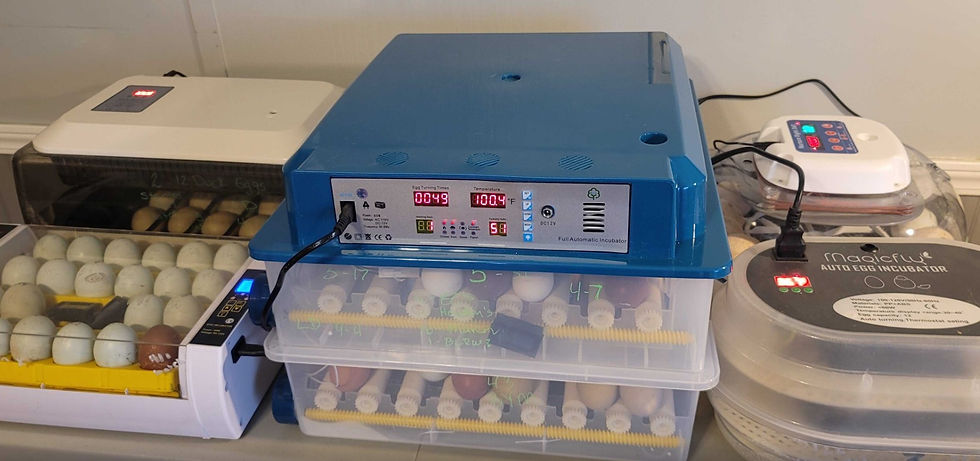The basic 101's of Hatching Chickens
- Mar 31, 2023
- 3 min read
Welcome fellow chicken enthusiasts! Today, we’re going to talk about the exciting process of incubating chickens. Whether you’re looking to hatch your own chicks or just want to understand the process better, this post is for you.
First things first, let’s talk about what you’ll need. You’ll need a reliable incubator, fertile eggs, and a lot of patience. It’s important to choose an incubator with a good reputation and accurate temperature and humidity control. Trust us, it’s worth investing in a good one.
Now, let’s get to the fun part - incubating! Here’s a day-by-day schedule of what to expect during the process:

(Above shown is our most popular and so far most reliable Incubator.) You can find it in our store here
It's a good idea to use a chalk marker, or a pencil and number each egg. I like to put an X on the center as well, to ensure the auto rotator is working. It's easy to spot an egg that isn't turning properly when you do this.
Day 1: Set your eggs in the incubator, making sure to handle them carefully to avoid cracking or damaging them. Make sure the temperature is at a consistent 99.5°F and the humidity is at 40-50%.
Day 2-17: This is the incubation period where the eggs will be kept at a consistent temperature and humidity. If you have an automatic turner, it will turn the eggs for you. If not, you’ll need to manually turn them at least three times a day.
IF you have a candle lighter you can see inside the egg. At this point you should see signs of life and movement or veins and systems forming.
Day 18: Stop turning the eggs and increase the humidity to 65%. This will help the chicks break out of their shells.
Day 19-21: The chicks will start to hatch! It’s important to keep the humidity high during this time to help them break through the shell.
Day 22: The incubation process is over and you’ll have a bunch of adorable, fluffy chicks to take care of!
After 2-3 days afterwards, I usually give the birds who haven't hatched a little extra change. If they don't they will need to be disposed off.

(Some of our Various Incubators in use today)
As you can see we have a variety of incubators, and some not shown here. The reason, is some do different things, for different birds, and some have bigger space like the one in the middle. It holds 140 eggs. Each one above has a unique trait that we like or use that is very specific to something we're hatching.
Now, let’s talk about some of the challenges you may encounter during incubation. One of the most common issues is a low hatch rate. This can be caused by a variety of factors, including poor egg quality, inconsistent temperature, or improper humidity levels. Make sure to do your research and follow the incubation process carefully to maximize your hatch rate.
Another potential issue is bacteria growth. This can be avoided by keeping the incubator clean and sterilized, and avoiding handling the eggs with dirty hands.
Remember that power is important. If you think the power could go out, you'll want to invest in a battery backup. They cost around 100.00 but worth it. 2-3 hours without power in some temperatures, is enough to loose the entire batch.
Your home AC/Heater will fight your incubator. AC/Heat units (heat pumps) do one things really good. They remove humidity from your home. They do this pretty well actually. During a hot summer day, you've probably noticed your AC line pouring water out. That's coming from your house.
If you're going to be in either cold or hot climates, you'll need to think about this. Humidity can be good for 1 minute, and 10 minutes later, down to 20!!! Then you can fix it

, and it will be good for 8 hours. This process of back and forth get's tiring. One thing to consider, is enclosing your incubator in a towel, blankets, boxes, or closets. Somewhere the outside is stable. Once you find the sweet spot, there's hardly any work if it's right. Sadly, the only way to learn this is trial and error for your space, home, temperature, climate etc.
In conclusion, incubating chickens is a fun and rewarding experience that requires patience, attention to detail, and a good incubator. Make sure to follow the process carefully, and don’t be afraid to ask for help if you encounter any issues. And remember, there’s nothing quite like the joy of seeing those little chicks hatch and grow up to be healthy chickens. So, get cracking and enjoy the process!

_edited.jpg)



Comments